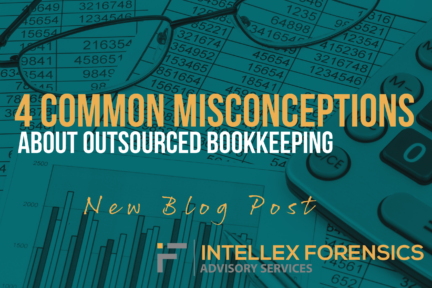Outsourced bookkeeping has become increasingly popular among businesses seeking to streamline their financial processes, yet several misconceptions still linger around this practice. In this blog post, we’ll debunk four common misconceptions about outsourced bookkeeping, shedding light on its benefits and dispelling any doubts.
1. “I can do it myself.”
One of the most prevalent misconceptions about outsourced bookkeeping is the belief that handling financial tasks in-house is the most efficient and cost-effective approach. While some business owners may possess basic bookkeeping skills, managing complex financial transactions and staying compliant with ever-evolving regulations requires expertise and precision.
Outsourced bookkeeping professionals are trained and experienced in navigating intricate financial landscapes. They bring specialized knowledge and advanced software tools to the table, ensuring accurate record-keeping and timely financial reporting. By outsourcing bookkeeping responsibilities, businesses can free up valuable time to focus on core operations and strategic growth initiatives.
2. “It is more expensive.”
Another common misconception is that outsourced bookkeeping services come with a hefty price tag, making them unfeasible for small to medium-sized businesses. However, when comparing the costs associated with hiring and retaining an in-house bookkeeper versus outsourcing to a third-party provider, the latter often proves to be more cost-effective.
In-house bookkeepers require salaries, benefits, training, and overhead expenses, which can quickly add up. On the other hand, outsourced bookkeeping services typically offer flexible pricing structures tailored to the specific needs and budget constraints of each client. By outsourcing, businesses can access professional expertise without the burden of long-term financial commitments or administrative overhead.
3. “I only need help during tax season.”
Some businesses mistakenly believe that outsourced bookkeeping services are only necessary during tax season when financial records are being prepared for filing tax returns. However, effective financial management extends far beyond annual tax obligations.
Outsourced bookkeepers play a crucial role in maintaining accurate and up-to-date financial records throughout the year, providing valuable insights into cash flow, budgeting, and financial forecasting. By partnering with a trusted bookkeeping service provider year-round, businesses can proactively identify opportunities for cost savings, mitigate financial risks, and make informed strategic decisions.
4. “It will take too much time to transition.”
Transitioning to outsourced bookkeeping may seem like a daunting task for businesses accustomed to managing their financial functions in-house. However, reputable bookkeeping service providers offer seamless onboarding processes designed to minimize disruption and maximize efficiency.
During the transition phase, experienced bookkeeping professionals work closely with clients to understand their unique business needs, existing financial processes, and technology infrastructure. They develop customized implementation plans tailored to each client’s requirements, ensuring a smooth and successful transition to outsourced bookkeeping services.
Moreover, outsourcing bookkeeping tasks allows businesses to leverage cutting-edge technology and automation tools, streamlining data entry, reconciliation, and reporting processes. As a result, businesses can achieve greater accuracy, efficiency, and scalability in their financial operations, ultimately driving long-term success and growth.
In conclusion, outsourcing bookkeeping offers numerous benefits for businesses seeking to optimize their financial processes and enhance operational efficiency. By debunking common misconceptions and embracing outsourced bookkeeping solutions, businesses can unlock new opportunities for growth, profitability, and financial stability.
If you found our 4 Common Misconceptions About Outsourced Bookkeeping to be helpful, check out our blog: Top 4 Reasons You Need a Bookkeeper
